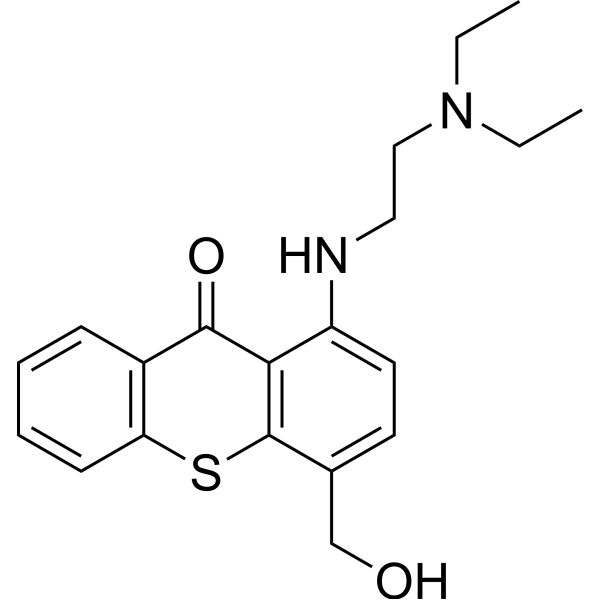
Hycanthone
CAS No. 3105-97-3
Hycanthone( Win 249-33 | Etrenol(mesylate) )
Catalog No. M26712 CAS No. 3105-97-3
Hycanthone is a potent drug of antischistosomal. Hycanthone is a DNA intercalator that inhibits RNA synthesis and DNA topoisomerases I and II.
Purity : >98% (HPLC)
 COA
COA
 Datasheet
Datasheet
 HNMR
HNMR
 HPLC
HPLC
 MSDS
MSDS
 Handing Instructions
Handing Instructions
| Size | Price / USD | Stock | Quantity |
| 5MG | 29 | In Stock |


|
| 10MG | 45 | In Stock |


|
| 100MG | Get Quote | In Stock |


|
| 200MG | Get Quote | In Stock |


|
| 500MG | Get Quote | In Stock |


|
| 1G | Get Quote | In Stock |


|
Biological Information
-
Product NameHycanthone
-
NoteResearch use only, not for human use.
-
Brief DescriptionHycanthone is a potent drug of antischistosomal. Hycanthone is a DNA intercalator that inhibits RNA synthesis and DNA topoisomerases I and II.
-
DescriptionHycanthone is a potent drug of antischistosomal. Hycanthone is a DNA intercalator that inhibits RNA synthesis and DNA topoisomerases I and II. Hycanthone inhibits nucleic acid biosynthesis and inhibits APE1 via direct protein binding(KD: 10 nM).(In Vitro):Hycanthone at 20 mg/mL or more is progressively more detrimental to cell viability. Compared to that of controls, results show that increased concentrations of Hycanthone, ranging from 0.1 to 10 μg/mL, progressively decreases viral interferon yields as much as 73% . (In Vivo):Male worms treated with Hycanthone display signs of possible partial recovery from the initial low levels of incorporation. After treatment with Hycanthone, the incorporation of tritiated thymidine into TCA-precipitable material of adult sensitive worms undergo a progressive decrease. Immature worms are totally unaffected by Hycanthone at all times tested. In the first four days after treatment, incorporation of tritiated leucine by drug-sensitive worms treated with Hycanthone is inhibited by 40 to 50%. 7 days after Hycanthone treatment, both ribosomal RNA species are reduced by at least 80% with respect to untreated worms, with some indication of a possible accumulation of heavier precursor molecules .
-
In VitroHycanthone has an IC50 of 80 nM for inhibition of APE1 incision of depurinated plasmid DNA. Hycanthone (0.05-100 μM; for 2 h) promotes APE1 cleavage in presence of Cycloheximide (CHX) and this cleavage is inhibited by 1% DMSO. Hycanthone at 20 mg/mL or more is progressively more detrimental to cell viability. Results reveal that increased concentrations of Hycanthone, ranging from 0.1 to 10 μg/mL, progressively reduces viral interferon yields as much as 73% compare to that of controls.
-
In VivoResults show that the incorporation of tritiated thymidine into TCA-precipitable material of adult sensitive worms undergo a progressive decrease after treatment with Hycanthone. Immature worms are totally unaffected by Hycanthone at all times tested. Male worms treated with Hycanthone show signs of a possible partial recovery from the initial low levels of incorporation. The incorporation of tritiated leucine by drug-sensitive worms treated with Hycanthone is inhibited by 40 to 50% in the first four days after treatment. Results show that, 7 days after Hycanthone treatment, both ribosomal RNA species are reduced by at least 80% with respect to untreated worms, with some indication of a possible accumulation of heavier precursor molecules.
-
SynonymsWin 249-33 | Etrenol(mesylate)
-
PathwayCell Cycle/DNA Damage
-
TargetDNA/RNA Synthesis
-
RecptorDrug-Linker Conjugates for ADC| Microtubule/Tubulin
-
Research Area——
-
Indication——
Chemical Information
-
CAS Number3105-97-3
-
Formula Weight356.48
-
Molecular FormulaC20H24N2O2S
-
Purity>98% (HPLC)
-
SolubilityIn Vitro:?DMSO : 12.5 mg/mL (35.07 mM)
-
SMILESCCN(CC)CCNc1ccc(CO)c2sc3ccccc3c(=O)c12
-
Chemical Name——
Shipping & Storage Information
-
Storage(-20℃)
-
ShippingWith Ice Pack
-
Stability≥ 2 years
Reference
1.Sanderson RJ, et al. In vivo drug-linker stability of an anti-CD30 dipeptide-linked auristatin immunoconjugate. Clin Cancer Res. 2005 Jan 15;11(2 Pt 1):843-52.
molnova catalog



related products
-
Azoxymethane
Azoxymethane (AOM) is a DNA damaging agent that induces cancer and can be used in mouse models of colorectal cancer.
-
Beaucage reagent
A potent DNA cleavage agent.
-
DHX9-IN-2
DHX9-IN-2 is an inhibitor targeting ATP-dependent RNA de-helicase A (DHX9) with anticancer and antitumor activity for cancer research.



 Cart
Cart
 sales@molnova.com
sales@molnova.com


